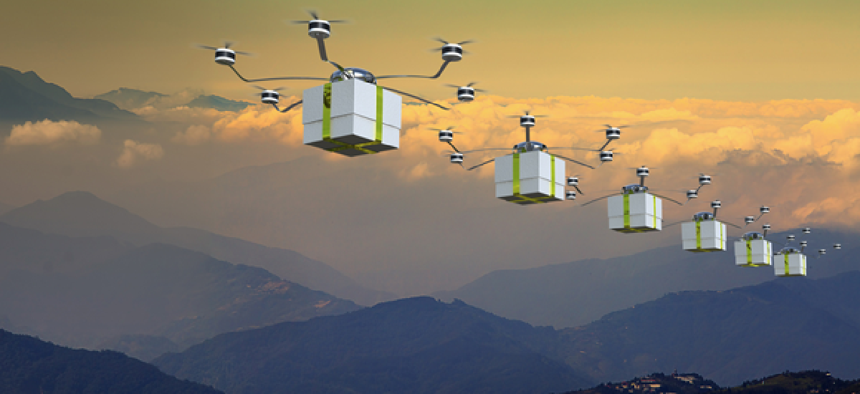Governments dream of drone-based development


Connecting state and local government leaders
The Federal Aviation Administration is evaluating applications from state and local governments that want to be a part of the nationwide Unmanned Aerial Systems Integration Pilot Program.
The Federal Aviation Administration is in the process of narrowing down a list of applications from state and local governments that want to be a part of the nationwide Unmanned Aerial Systems Integration Pilot Program.
The three-year pilot program was launched last fall to solicit proposals for advanced UAS operations that will expand commercial UAS operations and help the FAA determine how to safely integrate drones into the U.S. airspace.
“The pilot program will evaluate a variety of operational concepts, including night operations, flights over people, flights beyond the pilot’s line of sight, package delivery, detect-and-avoid technologies, counter-UAS security operations, reliability and security of data links between pilot and aircraft, as well as local management of UAS operations subject to FAA oversight,” agency spokesman Les Dorr said in an email.
There are 149 lead applicants, which will result in “as many as 10” winners to be announced in May, according to an FAA spokesperson.
Along with the lead applicants -- state, local or tribal governments – other public or private sector partners have applied as interested parties. There have been more than 2,800 interested-party applications, according to UAS Magazine.
The winning applicants will have access to expanded commercial drone operations in situations including beyond visual line-of-sight or over people. The Department of Transportation, meanwhile, will gain insight into drone operations and capabilities that will help guide future regulation.
Applicants have spoken about a wide range of UAS use cases -- from farm work to assisting in crime fighting.
The North Carolina Department of Transportation, for example, announced Feb. 5 it had submitted a proposal to use drones to deliver medical supplies across the state. Delivery is currently by courier, but a drone would allow blood and other supplies to reach doctors more quickly, saving lives, NCDOT Director of Aviation Bobby Walston said in a statement.
NCDOT would set up a network of distribution centers, and drones would deliver the supplies. The agency is working with two UAS companies, Matternet and Zipline, that currently operate overseas.
“We’ve been researching and investing in drone technology for years at NCDOT,” Walston said. “This proposal represents the next big step for us.”
Drone deliveries are possible with the technology currently available on the market, NCDOT spokesman James Pearce told The News and Observer.
“We don’t exactly know when you’ll see these drones flying around here, but the technology that we’re trying to do already exists,” Pearce told the paper. “They’re doing it in Europe. They’re doing it in Africa.”
Medical-supply delivery by drone has been tested stateside. Early efforts in the area include NASA’s Langley Research Center’s work in 2015 with the drone company Flirtey to deliver supplies to free clinics in Wise County, Va.
Louisville, Ky., has also applied for the pilot program. It wants to use drones to respond to gunshots identified by ShotSpotter, according to Insider Louisville, which reported the system would be automated and run through the Police Department’s Real Time Crime Center.
ShotSpotter can triangulate a shot to within 80 feet. But Louisville doesn’t have a dense network of security cameras, so officials may not have a camera near a shooting location. A drone-based camera would allow the police to get eyes on an area where a shot has been detected without the cost of building out a camera network, Grace Simrall, the city’s chief of civic innovation, told Insider Louisville.
New York state's proposal focuses on its diverse airspace and experience managing cross-border drone traffic with Massachusetts.
The Griffiss International Airport in Rome, N.Y., was one of the original UAS test sites, and it opened up the first leg of a drone corridor last year where companies can test different technologies related to drones including sensors and data integration platforms.
A proposal from Yuma, Ariz., focuses on agricultural and boarder patrol applications for drones. An official with the Yuma Center of Excellence for Desert Agriculture told Arizona's NBC 11 that drones outfitted with black lights, flying at night, could help find pathogens in crops.
Bluefield, W.Va., is hoping its mountainous geography will separate it from the other applicants and is targeting package delivery and air traffic notification applications, according to the Bluefield Daily Telegraph.
The pilot program winners will be announced May 7.
NEXT STORY: Another Gigabit City Takes Shape in Colorado




